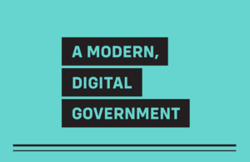Central Digital and Data Office (CDDO), Government Digital Service (GDS) and the Incubator for AI are all being moved from Cabinet Office to the Department for Science, Innovation and Technology (DSIT) in one of the first major machinery of government changes of the new administration.

The speed of this change is as significant as the change itself. It demonstrates a clear vision for how DDaT needs to work within government - hothousing to accelerate innovation.
As for the change itself - government spending on digital transformation is intended to be a catalyst for the wider economy. This places Civil Service DDaT squarely at the heart of the Government growth agenda, which is a very good place to be when it comes to clarity of mandate.
This significant shift will bring together all digital transformation of public services under one department - under the mission to create a "modern digital government".
This will form part of wider efforts to launch DSIT as the digital centre of government, working closely with the Cabinet Office and the Treasury to maximise the potential of digital, data and technology to deliver for the British public.
 “Britain will not fully benefit from the social and economic potential of science and technology without government leading by example," said Secretary of State Peter Kyle, announcing the change. "So, DSIT is to become the centre for digital expertise and delivery in government, improving how the government and public services interact with citizens.”
“Britain will not fully benefit from the social and economic potential of science and technology without government leading by example," said Secretary of State Peter Kyle, announcing the change. "So, DSIT is to become the centre for digital expertise and delivery in government, improving how the government and public services interact with citizens.”
The move is intended to help to up-skill civil servants so they are better at using digital and AI in their frontline work, as well as ensure the government has the right infrastructure and regulations in place to deliver on its long-term missions.
Acting as the partner and standard bearer for the government departments, DSIT will also support the use of technology across areas like energy, health, policing, and education with a focus on transforming how the British public interacts with the government.
Single login for streamlined identity verification and access to services as well as enhanced public sector interoperability will underpin the government's aim towards greater personalisation, convenience, and efficiency in public services.
Kyle added, “We will act as a leader and partner across government, with industry and the research communities, to boost Britain’s economic performance and power up our public services to improve the lives and life chances of people through the application of science and technology.”






 “Britain will not fully benefit from the social and economic potential of science and technology without government leading by example," said Secretary of State Peter Kyle, announcing the change. "So, DSIT is to become the centre for digital expertise and delivery in government, improving how the government and public services interact with citizens.”
“Britain will not fully benefit from the social and economic potential of science and technology without government leading by example," said Secretary of State Peter Kyle, announcing the change. "So, DSIT is to become the centre for digital expertise and delivery in government, improving how the government and public services interact with citizens.”
